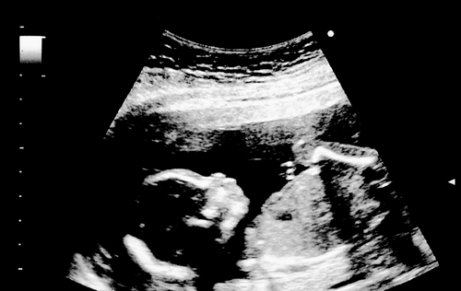Interesting Facts about the 18th Week of Pregnancy

Every week of gestation marks new changes for a mother and her developing baby. During the 18th week of pregnancy, babies reach the size of a medium-sized fruit.
At the same time, the bond between the mother and her child becomes stronger. This is partly due to the baby’s movements within the mother’s womb. At this point, mothers begin to notice more fetal activity, especially during the night.
With a bit of luck, some mothers are able to discover the sex of their baby this week. If the baby is a girl, her reproductive organs are already formed. As for boys, their genitals are already visible if the child is in the right position during an ultrasound.
Babies at 18 weeks of gestation
By the 18th week of pregnancy, the fetus measures around 5.5 inches and weighs approximately 6.5 or 7 ounces. The tiny baby’s movements are more and more vigorous.
During an ultrasound, you can observe the baby stretching and contracting his or her arms and legs. You may also see the fetus open and close its mouth as he or she learns to swallow.
Some specialists recommend playing music in order to stimulate the baby. There are also mothers who choose to speak to their little ones. Believe it or not, this can help calm and relax your baby.
Because of the transparency of the baby’s skin, his or her blood vessels are visible. Eyelashes and eyebrows also begin to appear and the child’s eyes and ears assume their permanent position. In an ultrasound, parents may get the chance to see their baby suck on his or her fingers.
An 18-week-old fetus also yawns and makes faces. Some even experience hiccups during pregnancy. When a fetus has the hiccups, he or she may even jump within the womb.

The mother’s body at 18 weeks of pregnancy
Without a doubt, the time has come for the mother to use maternity clothes. She can no longer hide her growing belly. During the 18th week of pregnancy, mothers may experience back pain – especially in the lower back.
This is because the uterus is growing more and more, making the woman’s belly heavier and heavier. This added weight places increased strain on the back.
Discomfort may also last into the night. Many women at this point already have a hard time finding a comfortable position to sleep in at night. The best position for pregnant women is to sleep on her left side. This way, she’ll avoid putting pressure on her vena cava, thus contributing to the flow of oxygen to the baby.
Placing a pillow between your legs or under your hip can help reduce back pain. The size of the uterus also puts pressure on the mother’s bladder. As a result, pregnant women feel the need to urinate often, especially at night.
Other typical symptoms of a mother’s 18th week of pregnancy include a lack of concentration. Pregnant women may feel disoriented and distracted. Some describe feeling like their heads are full of water. This is due to all of the hormonal changes that are going on inside the woman’s body.
Some women experience nightmares or sleeping disorders. Others may have radical mood swings and be more sensitive than usual.
To minimize the effects of these symptoms, it’s very important for pregnant women to stay active. The exercises increase the flow of oxygen to the brain, thus reducing anxiety and stress.

How to take care of yourself at 18 weeks
An expecting mother’s appetite tends to increase during the 18th week. Furthermore, women start to experience those well-known pregnancy cravings.
However, it’s important to maintain good nutrition during this stage of pregnancy. It’s not just important for your baby, but also to avoid putting on too much pregnancy weight.
To avoid becoming anemic, pregnant women should increase their intake of red meat, nuts and legumes. These foods help increase iron levels. And just like in previous weeks, it’s important for expectant mothers to stay hydrated. This means drinking at least 8 glasses of water a day.
Furthermore, pregnant women should take vitamin supplements and calcium supplements indicated by an OB/GYN.
Paternal pregnancy
Many men also complain about certain symptoms throughout their partner’s pregnancy. These symptoms can be quite varied. Fathers-to-be may experience physical symptoms like nausea, as well as emotional symptoms like mood swings and oversensitivity.
Every week of gestation marks new changes for a mother and her developing baby. During the 18th week of pregnancy, babies reach the size of a medium-sized fruit.
At the same time, the bond between the mother and her child becomes stronger. This is partly due to the baby’s movements within the mother’s womb. At this point, mothers begin to notice more fetal activity, especially during the night.
With a bit of luck, some mothers are able to discover the sex of their baby this week. If the baby is a girl, her reproductive organs are already formed. As for boys, their genitals are already visible if the child is in the right position during an ultrasound.
Babies at 18 weeks of gestation
By the 18th week of pregnancy, the fetus measures around 5.5 inches and weighs approximately 6.5 or 7 ounces. The tiny baby’s movements are more and more vigorous.
During an ultrasound, you can observe the baby stretching and contracting his or her arms and legs. You may also see the fetus open and close its mouth as he or she learns to swallow.
Some specialists recommend playing music in order to stimulate the baby. There are also mothers who choose to speak to their little ones. Believe it or not, this can help calm and relax your baby.
Because of the transparency of the baby’s skin, his or her blood vessels are visible. Eyelashes and eyebrows also begin to appear and the child’s eyes and ears assume their permanent position. In an ultrasound, parents may get the chance to see their baby suck on his or her fingers.
An 18-week-old fetus also yawns and makes faces. Some even experience hiccups during pregnancy. When a fetus has the hiccups, he or she may even jump within the womb.

The mother’s body at 18 weeks of pregnancy
Without a doubt, the time has come for the mother to use maternity clothes. She can no longer hide her growing belly. During the 18th week of pregnancy, mothers may experience back pain – especially in the lower back.
This is because the uterus is growing more and more, making the woman’s belly heavier and heavier. This added weight places increased strain on the back.
Discomfort may also last into the night. Many women at this point already have a hard time finding a comfortable position to sleep in at night. The best position for pregnant women is to sleep on her left side. This way, she’ll avoid putting pressure on her vena cava, thus contributing to the flow of oxygen to the baby.
Placing a pillow between your legs or under your hip can help reduce back pain. The size of the uterus also puts pressure on the mother’s bladder. As a result, pregnant women feel the need to urinate often, especially at night.
Other typical symptoms of a mother’s 18th week of pregnancy include a lack of concentration. Pregnant women may feel disoriented and distracted. Some describe feeling like their heads are full of water. This is due to all of the hormonal changes that are going on inside the woman’s body.
Some women experience nightmares or sleeping disorders. Others may have radical mood swings and be more sensitive than usual.
To minimize the effects of these symptoms, it’s very important for pregnant women to stay active. The exercises increase the flow of oxygen to the brain, thus reducing anxiety and stress.

How to take care of yourself at 18 weeks
An expecting mother’s appetite tends to increase during the 18th week. Furthermore, women start to experience those well-known pregnancy cravings.
However, it’s important to maintain good nutrition during this stage of pregnancy. It’s not just important for your baby, but also to avoid putting on too much pregnancy weight.
To avoid becoming anemic, pregnant women should increase their intake of red meat, nuts and legumes. These foods help increase iron levels. And just like in previous weeks, it’s important for expectant mothers to stay hydrated. This means drinking at least 8 glasses of water a day.
Furthermore, pregnant women should take vitamin supplements and calcium supplements indicated by an OB/GYN.
Paternal pregnancy
Many men also complain about certain symptoms throughout their partner’s pregnancy. These symptoms can be quite varied. Fathers-to-be may experience physical symptoms like nausea, as well as emotional symptoms like mood swings and oversensitivity.
All cited sources were thoroughly reviewed by our team to ensure their quality, reliability, currency, and validity. The bibliography of this article was considered reliable and of academic or scientific accuracy.
- Gallo, M., Sanchez, R., Gallo, J., Ruoti, M., & HernaNdez, A. (2013). Ecografia fetal de semana 18-22 de embarazo+ dvd.
- Vásquez-Montero, M., Soto, J., Pisconte, B., Mori-Quispe, E., Hinostrosa-Camposano, W. D., & Contreras-Pulache, H. (2013). Nutrición y embarazo: explorando el fenómeno en Pachacútec, Ventanilla-Callao. Revista Peruana de Epidemiología, 17(1), 01-04.
- Lugones Botell, Miguel, and Miguel R. Sarduy Nápoles. “Amnesia en el embarazo.” Revista Cubana de Obstetricia y Ginecología 45.1 (2019): 137-146.
This text is provided for informational purposes only and does not replace consultation with a professional. If in doubt, consult your specialist.








